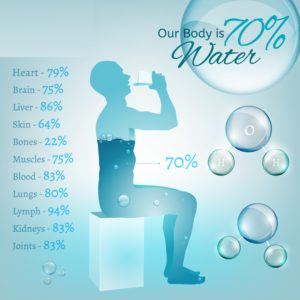 When summer temperatures rise, the risk of heat exhaustion increases. Generally, relative humidity of 60% or more hampers sweat evaporation, which hinders the body’s ability to cool itself. Risk of heat exhaustion − which can lead to heat stroke − increases when the heat index is 90 degrees or more. So along with avoiding sun exposure and strenuous outdoor activity during heat waves, it is important to stay hydrated.
When summer temperatures rise, the risk of heat exhaustion increases. Generally, relative humidity of 60% or more hampers sweat evaporation, which hinders the body’s ability to cool itself. Risk of heat exhaustion − which can lead to heat stroke − increases when the heat index is 90 degrees or more. So along with avoiding sun exposure and strenuous outdoor activity during heat waves, it is important to stay hydrated.
Although the body obtains hydrating fluids from food − about 20 percent of fluid intake comes through food − drinking water remains the healthiest way to ensure sufficient hydration, particularly during those “dog days” of summer.
How Much Do You Need? A healthy person can drink about three gallons of water per day, or about half their body weight in ounces per day. The daily recommended amount of water is 8-9 cups a day for women and 11-13 for men; more when water reserves are depleted though strenuous activity that further depletion through perspiration. In addition to helping regulate and maintain safe body temperatures,
WATER HELPS . . .
- Maintain the balance of body fluids. Water is needed for digestion, absorption, circulation — basically all body functions.
- Improve kidney health. The kidneys use water to get rid of waste products; without enough water, they can’t function optimally.
- Prevent osteoporosis. Adequate water intake has been shown to reduce the risk of osteoporosis and hip fractures.
- Relieve fatigue. One of the first signs of dehydration, fatigue is often a result of inadequate water intake.
- Improve mood. Even mild dehydration can have a negative effect on mood and cognitive functioning.
- Reduce headaches. Headaches and migraines are often caused by dehydration.
- Flush out toxins. Water helps flush toxins from the body through sweat and urine.
- Energize muscles. Muscle fatigue can result from lack of water.
- Prevent constipation. Water helps maintain normal bowel function.
A FEW TIPS TO MAKE SURE YOU’RE GETTING ENOUGH WATER?
- Drink a glass of water at every meal.
- Keep a water bottle handy and drink it throughout the day.
- Use free smart phone apps to track your water consumption.
- Use a timer to remind yourself to drink a glass of water throughout the day.
- Drink with a straw to ingest more water, more quickly
- Drink infused water (berries, melons, fruits, or herbs) instead of soda and other sugary drinks.
- Eat more fruits and vegetables, which are generally high in water content.
- Reduce intake of fluids that contain caffeine and alcohol, which can make you lose more fluids
Additional Resources:
1 -“Nutrition and Healthy Eating,” Mayo Clinic. www.mayoclinic.org/healthy-lifestyle/nutrition-and-healthy-eating/expert-answers/tap-vs-bottled-water/faq-20058017. Accessed August 14, 2015.
2 – Zelman, Kathleen.“6 Reasons to Drink Water,” WebMD, www.webmd.com/diet/6-reasons-to-drink-water. Accessed August 14, 2015.
3 – “Drinking Water Fun Facts,” Culligan Blog, www.culligan.com/en-us/d/blog/drinking-water-facts/. Accessed August 14, 2015.
4 – “Health Benefits of Drinking Water,” Organicfacts.net, www.organicfacts.net/health-benefits/other/health-benefits-of-drinking-water.html. Accessed August 14, 2015.